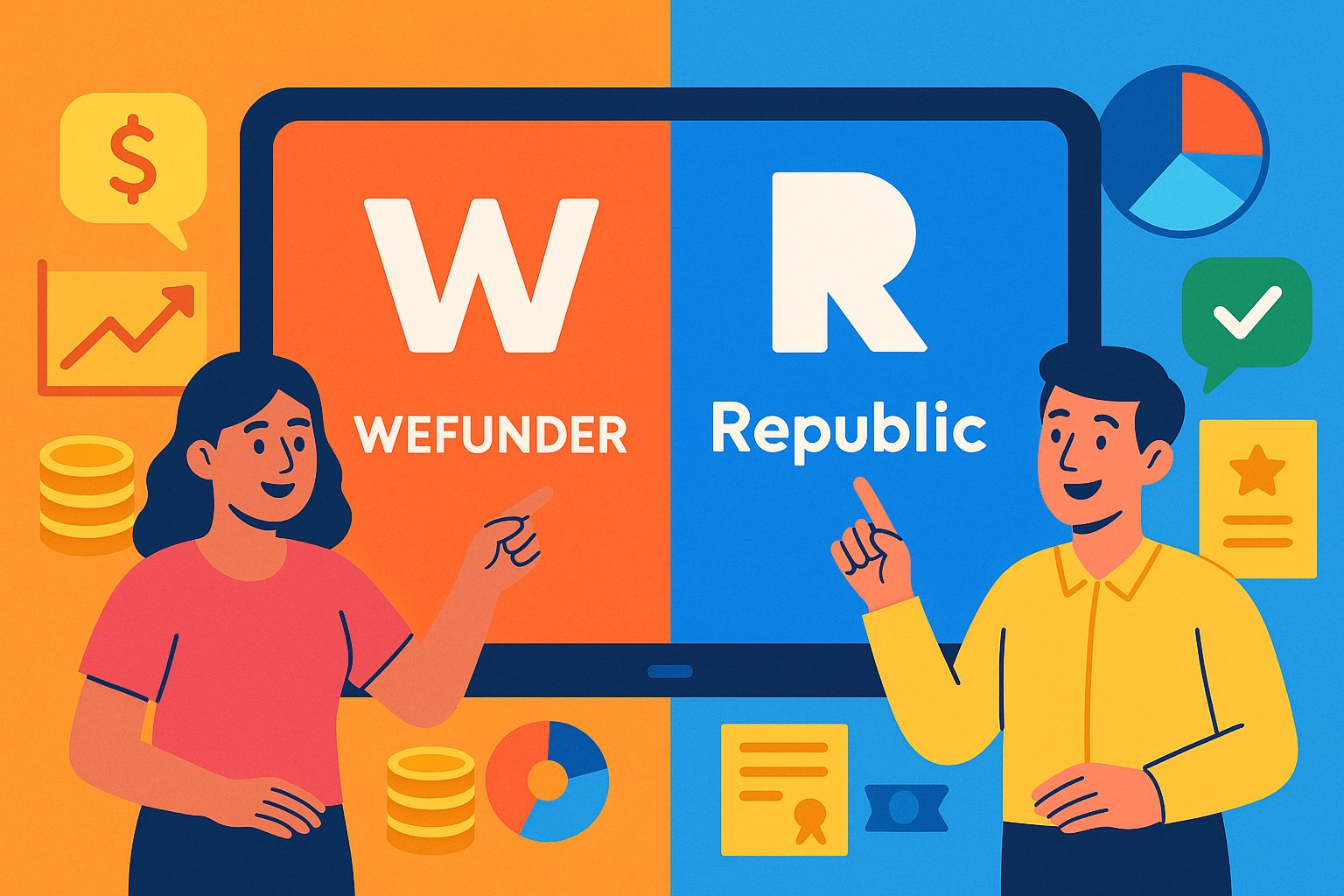Setting Sail on the Fee Frontier: Your First Look
When you embark on an equity crowdfunding campaign, the thrill of unlocking new capital channels can be intoxicating. However, beneath the surface excitement lies a crucial determinant of your success: fees. For founders, understanding every percentage point and processing charge is as vital as crafting the perfect pitch. In the face of burgeoning platforms, Wefunder and StartEngine stand out as leading options—each touting robust support, engaged communities, and, importantly, distinct fee structures. Navigating these financial undercurrents will not only help you budget effectively but also maximize the net proceeds that fuel your growth. In this deep-dive, we’ll unpack every facet of Wefunder and StartEngine fees, reveal hidden costs, and equip you with strategies to optimize your fundraising efficiency. Whether you’re planning a lean seed round or a sizable Series A–style campaign, this guide will illuminate the critical fee considerations every founder should know.
Decoding Platform Philosophy: Why Fees Reflect Value
Fee structures are more than mere line items on a budget sheet; they reflect each platform’s core philosophy and service offering. Wefunder, founded on a community-first ethos, balances competitive success fees with bundled compliance and marketing tools designed to support first-time fundraisers. StartEngine, with its emphasis on analytics and secondary trading, positions fees as an investment in advanced reporting, liquidity options, and a broader investor network. By appreciating how each platform allocates its revenue—toward mentorship programs, compliance partnerships, or technology upgrades—you’ll gain insight into the value you receive in exchange for every dollar you pay.
The Heart of the Matter: Success Fees Compared
Success fees form the lion’s share of crowdfunding costs. Wefunder typically charges a 7.5% success fee on the total funds raised. This rate covers campaign hosting, basic compliance support, and community promotion. StartEngine’s headline fee sits slightly lower at 7%, reflecting its strategy to attract larger-volume campaigns. On the surface, a half-percent difference may seem trivial, but on a $1 million raise, it translates into $5,000—capital that could fund additional marketing or product development. When comparing these rates, consider not only the percentages but also the baseline services each fee unlocks: campaign coaching, referral widgets, investor Q&A management, or access to secondary market features.
Payment Processing and Escrow Charges: The Hidden Currents
Beneath success fees, payment processing and escrow services add another layer of cost. Both platforms enlist third-party processors—Stripe, Dwolla, or similar—to handle credit card and ACH transactions. These fees generally range from 2% to 2.5% per transaction, depending on payment method and volume discounts. Wefunder combines a 2% escrow fee into its overall processing charge, simplifying invoicing for founders. StartEngine separates its 2% processing fee, potentially increasing transparency but requiring careful reconciliation. Since smaller investments can incur flat transaction fees, high-investor-count campaigns must model these costs meticulously to avoid surprises that eat into net proceeds.
Optional Extras: Ancillary Fees for Enhanced Services
Equity crowdfunding platforms often offer optional services that can accelerate your campaign—but at a price. Wefunder’s legal compliance bundle includes Form C drafting, audited financial statements, and Blue Sky filings for an additional percentage. StartEngine provides premium marketing packages—video production support, email campaign design, and influencer outreach—that founders can add to the core fee structure. While these add-ons can reduce administrative burden and enhance campaign polish, they can also inflate overall costs by 1% to 3%. Founders should weigh the time and expertise required to handle these services internally against the incremental fees to determine whether outsourcing is cost-effective.
Legal and Compliance Workflows: Streamlined vs. Modular
Navigating SEC regulations and state securities laws represents a substantial portion of your crowdfunding journey. Wefunder’s approach is turnkey: for a fixed fee, they partner with reputable law firms to bundle disclosures, audits, and state registrations into one cohesive package. This “all-in-one” method often appeals to first-time founders seeking simplicity. StartEngine adopts a modular strategy, letting you select individual legal services à la carte or integrate your own counsel. This flexibility can yield cost savings—but requires deeper coordination and understanding of each compliance milestone. If your internal legal resources are limited, the peace of mind provided by Wefunder’s bundled approach may outweigh the potential cost savings of a modular framework.
Fee Reductions and Incentives: Unlocking Discounts
Some platforms incentivize larger capital targets with sliding fee scales or milestone-based discounts. StartEngine occasionally offers fee rebates if you exceed predetermined raise thresholds—such as reducing the success fee by 0.5% after surpassing $2 million in commitments. Wefunder, in contrast, provides fee waivers on processing costs for startups in specific sectors or mission-driven initiatives, like clean energy or social impact companies. Early-stage founders should proactively inquire about these programs during onboarding. By setting stretch goals that align with discount tiers and understanding sector-specific incentives, you can strategically amplify net funds raised.
Modeling Your Net Proceeds: From Gross to Garden
Gross commitments tell only part of the story. To know how much capital will actually land in your bank account, build a net proceeds model. Start with your target raise—say $500,000—then subtract:
-
Success fee (7.5% for Wefunder or 7% for StartEngine)
-
Payment processing (2%–2.5%)
-
Optional service fees (legal bundles, marketing add-ons)
-
Escrow fees (where applicable)
On Wefunder, a $500,000 raise might incur roughly $47,500 in platform fees and another $12,500 in processing costs, leaving $440,000. On StartEngine, you could pay $35,000 in success fees, $12,500 in processing, and additional marketing fees, netting approximately $447,500. These rough calculations underscore the importance of modeling multiple scenarios—varying raise size, optional service adoption, and projected transaction volume—so you can manage cash flow expectations and gauge the true cost of capital.
Strategies to Optimize Fee Efficiency
Savvy founders can employ tactics to minimize fee impact and stretch every dollar. Staggering raises across multiple tranches may unlock tiered discounts. Negotiating bespoke service agreements—especially if you bring prior campaign success or industry clout—can reduce or waive ancillary fees. Leveraging in-house legal and marketing teams to handle compliance documents or content production can sidestep add-on charges. Finally, consolidating investment payments into fewer, larger transactions (where regulatory constraints allow) can cut down on per-transaction fees. By combining these strategies with a disciplined net proceeds model, you’ll maximize the raw capital fueling your next product milestone or sales expansion.
Long-Term Considerations: Fees Beyond the First Raise
Equity crowdfunding isn’t a one-off event; it’s the opening chapter of an ongoing investor relationship. Be mindful of potential fees tied to secondary trading, follow-on rounds, or pro-rata rights management. StartEngine’s secondary market infrastructure may charge transaction fees when shares change hands post-close, while Wefunder’s emerging marketplace could follow a different fee schedule. As you contemplate future liquidity events or subsequent funding rounds, map out how each platform’s fee evolution will affect your capitalization table and investor incentives. Early clarity on these long-term costs ensures that you maintain alignment with backers and preserve maximum value as your company scales.
Navigating the Fee Maze: Making Your Choice
Ultimately, the decision between Wefunder and StartEngine fees boils down to your campaign’s size, complexity, and support needs. If you prioritize comprehensive, bundled compliance services and community-driven promotion, Wefunder’s slightly higher success fee may be justified by the peace of mind and guidance you receive. If your startup demands advanced analytics, co-investment opportunities, and a modest discount on the headline fee, StartEngine’s leaner 7% rate could better suit your goals. By dissecting every line item—from success fees to per-transaction charges—and aligning them with your budget, timeline, and in-house capabilities, you’ll choose the platform that not only funds your vision but also maximizes the net resources available to fuel your next phase of growth.
Charting Your Path Forward: Fee Mastery for Founders
Fees need not be a murky afterthought; they can become a strategic lever in your fundraising arsenal. Armed with a detailed grasp of Wefunder and StartEngine’s fee architectures, you can model realistic net proceeds, negotiate discounts, and optimize your service mix for maximum capital efficiency. Whether you’re a solopreneur launching your first campaign or a seasoned founder scaling toward a Series B, fee mastery empowers you to preserve more capital, sustain investor momentum, and accelerate your startup’s trajectory. As you prepare to launch, revisit your financial plan, refine your net proceeds calculations, and solidify your fee negotiation strategy. By treating fees not as a fixed cost but as a dynamic variable, you can steer your equity crowdfunding adventure toward smoother waters—and richer rewards.




